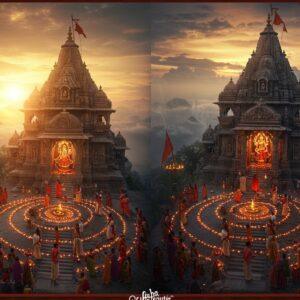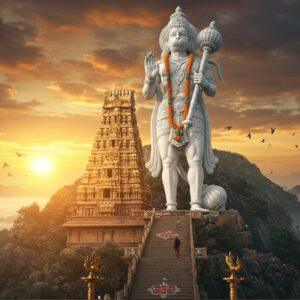
Udaipur, the “City of Lakes,” is renowned for its palaces and tranquil beauty. But beyond the royal grandeur lies a rich spiritual and cultural heritage, deeply woven into the fabric of the city. This exploration delves into the heart of Udaipur’s spiritual landscape, revealing sacred sites, local deity reverence, and the soul-stirring power of devotional music. It’s a journey for those who cherish tradition and seek authentic cultural experiences.
Majestic Temples: Symbols of Faith
Udaipur’s temples are not merely architectural marvels; they are living testaments to faith and devotion. The Jagdish Temple, dedicated to Lord Vishnu, stands as a magnificent example of Indo-Aryan architecture. Built in 1651 by Maharana Jagat Singh, its intricate carvings and towering structure inspire awe. Inside, a black stone idol of Lord Vishnu resides, alongside smaller shrines dedicated to other deities. You can find beautiful idols of Lord Vishnu and other deities on Poojn.in.
A short distance from Udaipur, the Eklingji Temple, dedicated to Lord Shiva, beckons. This ancient temple, believed to have been built in the 8th century by Bappa Rawal, is considered the ruling deity of Mewar. The four-faced idol of Lord Shiva within the temple is a powerful symbol of devotion, surrounded by intricate carvings that tell stories of faith. Explore our collection of exquisite Shiva idols and other puja essentials at Poojn.in.
The Shrinathji Temple, dedicated to Lord Krishna, is a significant pilgrimage site, especially during Janmashtami. Its architecture beautifully blends traditional Rajasthani style with intricate decorative work, creating a serene and spiritual atmosphere. Celebrate Janmashtami with authentic puja items from Poojn.in.
Overlooking the serene Fateh Sagar Lake, the Neemach Mata Temple offers a peaceful retreat for reflection and prayer. It’s a place where devotees seek blessings and solace amidst the natural beauty of Udaipur.
Celebrating Cultural Heritage
Udaipur’s cultural heritage is a vibrant tapestry of traditions, expressed through dance, music, cuisine, and festivals. Folk dances like Ghoomar, Kalbeliya, and Bhavai are an integral part of the city’s identity. Performed during festivals and cultural events, these dances showcase vibrant costumes, rhythmic movements, and captivating storytelling. Poojn.in offers a wide selection of traditional masks and other cultural items that reflect the artistic heritage of Rajasthan.
The cuisine of Udaipur is a reflection of its cultural and religious influences, predominantly vegetarian and deeply rooted in Jain and Vaishnav traditions. Dishes like Dal Baati Churma, Gatte ki Sabzi, and Mirchi Bada are not just culinary delights; they are expressions of the city’s cultural identity. Poojn.in has a blog, Alochana, with articles like A Complete Guide to Laddu Gopal: 10 Essential Facts You Need to Know and Lord Vishnu and his Dashavatars.
Festivals in Udaipur are celebrated with immense enthusiasm. Diwali and Holi, in particular, transform the city into a kaleidoscope of colors, music, dance, and rituals. These celebrations are an opportunity to witness the city’s spiritual heritage come alive. Poojn.in offers a wide range of products and resources to help you celebrate these festivals with authenticity.
The Sacred Geography of Ahar Cenotaphs
Just a short distance from Udaipur lie the Ahar Cenotaphs, a site of historical and spiritual significance. These cenotaphs, numbering over 250, serve as memorials to the Maharanas of Mewar. The architecture reflects a blend of Mughal and Rajput styles, with intricate carvings and majestic domes. The Ahar Cenotaphs are not just memorials; they are sacred spaces where rituals are performed to honor ancestors, keeping the Rajput tradition of reverence alive.
Vibrant Local Deity Worship
Local deity worship is an integral part of the spiritual fabric of Udaipur and the wider Mewar region. Deities like Ban Mata, Eklingji, and Shrinathji hold a special place in the hearts of the people, embodying local traditions and beliefs. The Eklingji Temple, dedicated to Lord Shiva, serves as a central hub for these practices, offering insights into the rich tapestry of Shaivism in Mewar. Unique rituals and festivals, like the vibrant processions during the Baneshwar Fair, are a testament to the enduring power of these local traditions. Check out our collection of holy jewellery to adorn your deities.
Bhajans and Kirtans: Heartbeat of Devotion
Bhajans and Kirtans, devotional songs that express faith and reverence, are an essential element of spiritual gatherings in Udaipur. Rooted in the Bhakti movement, these songs are often inspired by saints like Meera Bai. Local musicians, playing traditional instruments like the harmonium and tabla, bring these songs to life, creating an atmosphere of shared spirituality. These devotional songs are performed in various settings, from temple courtyards to religious festivals, offering solace, connection, and a profound sense of community. Find authentic musical instruments for your spiritual practice at Poojn.in.
FAQs: Your Questions Answered
What is the significance of the Ahar Cenotaphs? The Ahar Cenotaphs are more than just memorials; they are sacred spaces where rituals honor the ancestors of the Mewar rulers, reflecting the deep-rooted Rajput tradition of ancestor reverence. They are also a beautiful example of blended Mughal and Rajput architecture.
Why is local deity worship unique in the Mewar region? Local deity worship in Mewar is unique due to its deep connection to the land, the specific deities revered, and the unique rituals and festivals associated with them. These traditions are passed down through generations, creating a strong sense of community and cultural identity.
How do Bhajans and Kirtans enrich spiritual gatherings? Bhajans and Kirtans create a shared space for expressing devotion, fostering a sense of unity and peace among participants. They provide a powerful emotional and spiritual connection through music and shared faith. They also showcase local musical talent and traditions.
What distinguishes Udaipur’s cultural heritage? Udaipur’s heritage blends Rajput history, unique art forms, and spiritual practices. It’s not just about palaces; it’s about the living traditions, local deity worship, and music that make the city truly special. Udaipur offers a unique blend of royal grandeur and spiritual richness.
Which festivals highlight Udaipur’s spiritual heritage? Festivals like Gangaur, Teej, and Holi showcase Udaipur’s spiritual heritage. These vibrant celebrations are full of rituals, traditional dances, music, and community gatherings, reflecting the city’s rich cultural tapestry.
How is Udaipur’s heritage preserved? The community actively participates in traditional festivals, rituals, and daily religious practices. Elders share stories, songs, and customs with younger generations, ensuring the continuity of Udaipur’s rich heritage.
What role do local artisans play in Udaipur’s heritage? Local artisans are essential to preserving Udaipur’s cultural heritage. Their traditional crafts, paintings, and sculptures reflect the city’s history, spirituality, and artistic brilliance, adding to its vibrant cultural landscape.
Can visitors engage in spiritual and cultural activities? Absolutely! Visitors can participate in temple rituals, local festivals, traditional music performances, and more, offering an immersive experience of the city’s living heritage.
Discovering Udaipur’s Spiritual and Cultural Heritage with Poojn
At Poojn.in, we are passionate about helping you connect with India’s rich spiritual and cultural heritage. We offer a wide range of authentic puja items and resources to support your spiritual journey. Visit our website Poojn.in to explore our diverse collection.


